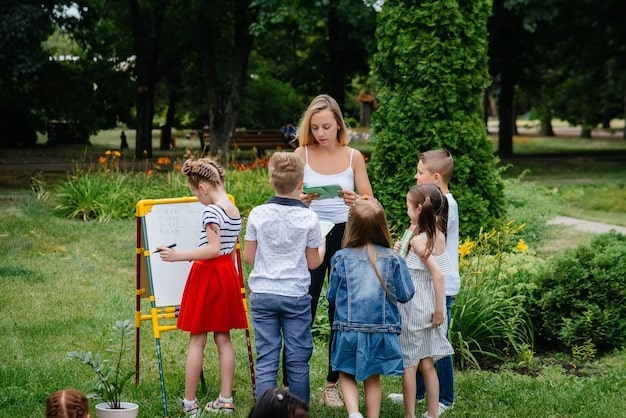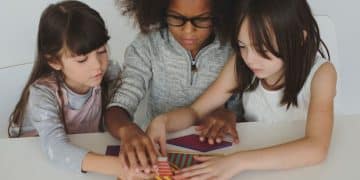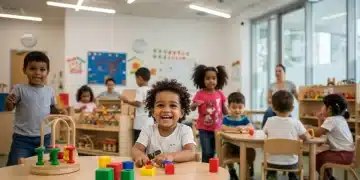The Importance of Play-Based Learning in Childcare: US Experts in 2025

Play-based learning is crucial in childcare, fostering creativity, problem-solving, and social skills, and US experts in 2025 emphasize its role in preparing children for future academic and life success.
The Importance of Play-Based Learning in Childcare: What US Experts Say in 2025 is a critical topic for parents and educators alike. In an ever-evolving educational landscape, understanding the value of play in early childhood development is paramount.
Understanding the Core of Play-Based Learning
Play-based learning is more than just letting children have fun; it’s a structured approach that utilizes play as a medium for learning. It integrates educational goals into playful activities, making learning engaging and effective.
Defining Play-Based Learning
At its heart, play-based learning is about facilitating learning through activities that are child-led and enjoyable. It allows children to explore, experiment, and discover at their own pace.
Key Principles of Play-Based Learning
Several principles underpin play-based learning, including active engagement, exploration, and the integration of different developmental domains.
- Child-Led Activities: Children have the freedom to choose their activities, fostering independence and decision-making skills.
- Hands-On Exploration: Learning is experiential, involving tangible materials and real-world scenarios.
- Integration of Domains: Play seamlessly blends cognitive, social, emotional, and physical development.
Play-based learning isn’t just about fun and games; it’s a carefully designed educational approach that leverages the power of play to foster holistic development in children.
The Developmental Benefits of Play
Play is not just a pastime; it’s a cornerstone of child development. It influences various aspects of a child’s growth, from cognitive abilities to social skills.

Cognitive Development
Play enhances cognitive functions such as problem-solving, critical thinking, and creativity. Activities like puzzles and construction games challenge children to think logically and strategically.
Social and Emotional Development
Through play, children learn to negotiate, cooperate, and empathize with others. Role-playing and group games provide opportunities to develop social skills and emotional intelligence.
Play significantly contributes to a child’s overall development, nurturing cognitive abilities, social skills, and emotional intelligence in a holistic manner.
Expert Perspectives on Play-Based Learning in 2025
In 2025, US experts are increasingly advocating for play-based learning as a vital component of early childhood education. Their insights highlight the long-term benefits of this approach.
Shifting Paradigms in Education
Experts note a shift away from traditional, teacher-centered methods towards more child-centric, play-based approaches. This change is driven by research demonstrating the effectiveness of play in fostering deep learning.
Integrating Technology into Play
The integration of technology into play-based learning is another key trend. Educational apps and interactive games are being used to enhance learning experiences while maintaining the principles of play.

Experts in 2025 are emphasizing the importance of play-based learning as an essential element in early childhood education, advocating for its integration with technology and a shift towards more child-centered educational paradigms.
Practical Applications in Childcare Settings
Implementing play-based learning in childcare settings requires careful planning and a supportive environment. Here are some practical ways to integrate play into daily routines.
Creating a Play-Friendly Environment
Design the childcare space to be stimulating and conducive to play. This includes providing a variety of toys, games, and open spaces for exploration and movement.
Incorporating Play into Daily Routines
Integrate play-based activities into various parts of the day, such as circle time, outdoor play, and thematic units. Even simple activities like storytelling and singing can be transformed into playful learning experiences.
- Themed Play Areas: Set up areas with different themes, like a kitchen, a construction site, or a reading nook.
- Outdoor Adventures: Use the outdoors for sensory play, nature exploration, and physical activities.
- Creative Arts: Incorporate arts and crafts projects that encourage creativity and self-expression.
Implementing play-based learning in childcare settings involves creating a supportive environment and integrating playful activities into daily routines to enhance children’s learning experiences.
Addressing Common Concerns About Play-Based Learning
While play-based learning is widely accepted, some concerns persist among parents and educators. Addressing these concerns is crucial for widespread adoption.
Ensuring Academic Rigor
One common concern is whether play-based learning can provide sufficient academic rigor. However, research shows that play can enhance cognitive abilities and prepare children for formal learning.
Measuring Progress and Outcomes
Measuring progress in play-based learning can be challenging, as outcomes are often qualitative rather than quantitative. Observation, portfolios, and anecdotal records are effective assessment tools.
Addressing common concerns about academic rigor and progress measurement is essential for the successful implementation and acceptance of play-based learning.
The Future of Play-Based Learning in the US
Looking ahead, play-based learning is poised to become an even more integral part of early childhood education in the US. Several trends are shaping its future.
Increased Emphasis on Holistic Development
There’s a growing recognition of the importance of holistic development, which encompasses cognitive, social, emotional, and physical well-being. Play-based learning is uniquely positioned to address these needs.
Policy and Advocacy Efforts
Policy and advocacy efforts are playing a crucial role in promoting play-based learning. Initiatives to increase funding for early childhood education and professional development for educators are gaining momentum.
The future of play-based learning in the US is bright, with increased emphasis on holistic development and growing policy support paving the way for its widespread adoption.
| Key Point | Brief Description |
|---|---|
| 🧠 Cognitive Benefits | Enhances problem-solving and critical thinking. |
| 🤝 Social Skills | Fosters cooperation and empathy through group activities. |
| 🧸 Child-Led Learning | Encourages independence and decision-making skills. |
| 🚀 Future Trends | Increased emphasis on holistic development and policy support. |
Frequently Asked Questions
▼
Play-based learning is an educational approach that uses play as a context for learning. It allows children to explore, experiment, discover, and solve problems in imaginative and engaging ways.
▼
It enhances cognitive abilities, promotes social and emotional development, and improves physical skills. It also fosters creativity, problem-solving, and critical thinking.
▼
While commonly used in early childhood education, the principles of play-based learning can be adapted for older children and even adults. The key is to make learning engaging and relevant.
▼
Parents can provide a variety of toys and materials that encourage open-ended play. Encouraging outdoor activities and making time for family games are also essential.
▼
Experts highlight its importance in fostering holistic development and preparing children for future success. They advocate for its integration with technology and policy support.
Conclusion
In conclusion, the importance of play-based learning in childcare: what US experts say in 2025 underscores its pivotal role in fostering holistic development. Integrating play into early education not only enhances cognitive and social skills but also prepares children for a rapidly evolving future. As experts emphasize, embracing play-based methods can lead to more engaged, creative, and well-rounded individuals.





